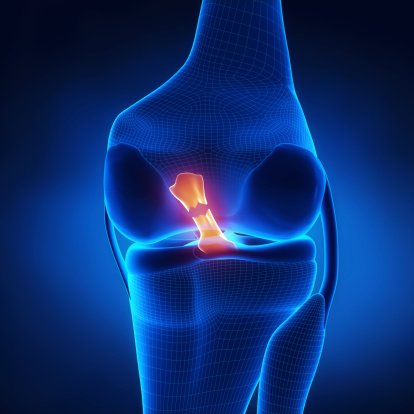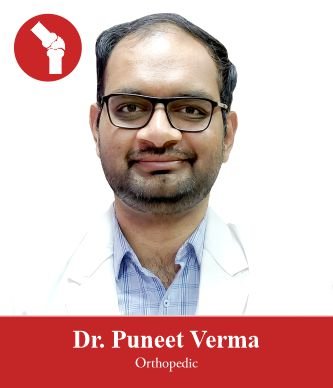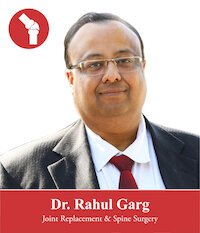ACL Injury–Knee
Overview -
Anterior Cruciate Ligament (ACL)
An ACL tear or sprain is a tear in the anterior cruciate ligament (ACL) or sprain of the thick tissue band that joins your thigh bone (femur) to your shinbone (shinbone) (tibia). ACL injuries are most prevalent in sports that require fast stops or changes in direction, jumping, and landing, such as soccer, basketball, football, and downhill skiing.
Many people hear a snap or experience a "popping" sensation in their knee when their ACL is damaged. Your knee may grow, become unstable, and become too painful to bear weight on.
Depending on the severity of your ACL damage, rest and rehabilitation exercises, or surgery to repair the torn ligament followed by therapy, can help you regain strength and stability. A good training regimen can assist to reduce the risk of ACL damage.
Why it's done -
ligaments in the middle of your knee that cross.
ACL injuries commonly occur as a result of sports and fitness activities that place stress on the knee:
Taking a direct strike to the knee or colliding with another object, such as a football tackle
Pivoting with your foot firmly planted
Landing awkwardly following a jump
Stopping suddenly
When a ligament is torn, it usually results in a partial or full tear of the tissue. A little injury to the ligament may stretch it yet leave it intact.
For more information related to ACL-Injury-Knee Surgery, Please visit Medipulse hospital website or Orthopaedics and Trauma departments of Our hospital to get an expert opinion on your problem
Surgery Procedure –
Procedure for an ACL tear will vary depending upon the patient's individual needs. For example, a young athlete who participates in agility sports will almost certainly require surgery in order to return to sports safely. Without surgery, the less active, usually older, individual may be able to return to a more relaxed lifestyle.
Non-surgical Procedure:
An ACL injury need surgery to repair. Patients who are elderly or have a low level of exercise may benefit from nonsurgical treatment. If your knee's general stability is good, your doctor may suggest nonsurgical alternatives.
Bracing, A brace may be recommended by your doctor to protect your knee against instability. Crutches may be prescribed to keep you from putting weight on your leg, further protecting your knee.
Physical therapy is a type of treatment that involves the use of A careful rehabilitation regimen is undertaken once the swelling has subsided. Your knee will regain function and the leg muscles that support it will be strengthened through specific workouts.
surgical Procedure:
The ligament is now being repaired. Most ACL rupture cannot be repaired with sutures (stitches). To restore knee stability, the ACL must be surgically repaired and rebuilt. Your torn ligament will be repaired with a tissue transplant. This graft is used to lay the groundwork for the formation of a new ligament.
Grafts can be found in a number of places. The patellar tendon connects the kneecap to the shinbone and is commonly utilised. The rear of the thigh's hamstring tendons are routinely used for grafts. Occasionally, the quadriceps tendon, which links the kneecap to the thigh, is used. Finally, a cadaver allograft transplant can be used.
All graft sources offer benefits and drawbacks. Discuss your choices with your orthopaedic physician to determine which transplant is best for you.
Because regeneration takes time, it may take six months or longer for an athlete to return to sports following surgery.
Procedure. Through small incisions, an arthroscope is utilised to rebuild the anterior cruciate ligament. Traditional surgery is more invasive than arthroscopic surgery. Less intrusive techniques offer the benefit of causing less pain during surgery, spending less time in the hospital, and recovering faster.
Risk and complications -
There are several variables that enhance your chances of tearing your ACL, including:
Using sporting equipment that isn't well-maintained, such as ski bindings that aren't correctly adjusted
Using incorrect movement patterns, such as squatting with the knees inward.
Putting on shoes that don't fit properly
Poor conditioning
Soccer, football, basketball, gymnastics, and downhill skiing are some of the sports that people take part in.
People who have had an ACL damage are more likely to develop osteoarthritis in their knee. Even if you have surgery to rebuild the ligament, you may develop arthritis.
The severity of the original injury, the presence of concomitant injuries in the knee joint, and the degree of activity after treatment are all likely to influence the likelihood of arthritis.
Insurance Covered – Following insurances are covered for ACL Injury–Knee :
| Health Insurance | Insurance covered |
|---|---|
| Chiranjeevi swasthya bima yojana / Ayushman bharat yojana | √ |
| RGHS | √ |
| ECH | √ |
| Indian Railway | √ |
| CGHS | √ |
| ESIC | √ |
| RBSK | ✗ |
| Ayushman CAPF | √ |
The average length of stay - entails 3 days in hospital & 2-3 weeks to fully recover.
FAQ-
1.Can an ACL tear heal without surgery?
Non-surgical treatments and regenerative medicine therapy may be used to cure tiny tears (sprains). Full ACL tears, on the other hand, cannot be repaired without surgery. Physical therapy rehabilitation may be all you need if your activities do not include pivoting movements on the knee.
2.How long does an ACL knee injury take to heal?
Recovering from surgery to repair a ligament tear might take up to 8 weeks. However, if a damaged ligament requires substantial reconstruction, Bush-Joseph estimates that it will take 6 months or more to return to full strength.
3. How do I know if my knee injury is serious?
Signs your knee injury could be serious
- Swelling. In most cases, it is normal for your knee to contain a bit of fluid around the injured area.
- Pop sound.
- Impossible to bear weight.
- Your knee giving out or buckling under pressure.
- A locked knee.
- Inability to fully extend the knee.
4. Do ACL Injury–Knee surgery surgeons in Medipulse Hospital, Jodhpur provide guidance to manage post-operative pain?
In Medipulse Hospital, doctor will recommend appropriate medicines or pain management options for post-operative care.
5. Does health insurance cover ACL Injury–Knee surgery at Medipulse Hospital, Jodhpur?
Yes, In Medipulse Hospital, Jodhpur health insurance cover ACL Injury–Knee surgery. It is recommended to inquire with the insurance provider at Medipulse Hospital for more details.
Doctors who perform ACL Injury-Knee Surgery procedure :
Dr. Puneet Verma
Department of Orthopedics and Joint Replacement
Area of expertise :
Basic and complex trauma, Acetabular fracture fixation, Complex juxta-articular trauma, Pediatric trauma and corrective osteotomies, Primary and revision Total Knee arthroplasty, Primary and revision Total Hip arthroplasty, Primary Shoulder arthroplasty, Primary Elbow arthroplasty, Arthroscopy and Sports medicine, Joint arthrodesis
Dr. Dushyant Goswami
Dr. Rahul Garg
Department of Orthopedics and Joint Replacement.
Area of expertise :
Total Knee Replacement Primary & Difficult Primary TKR 1100+ in Jodhpur, Revision TKR 100+, Primary THR uncemented 500+, Primary THR cemented 5000+, Primary / Revision with Navigation frequent / on-demand, Polytraumas / High Query Trauma: Rewardingly




